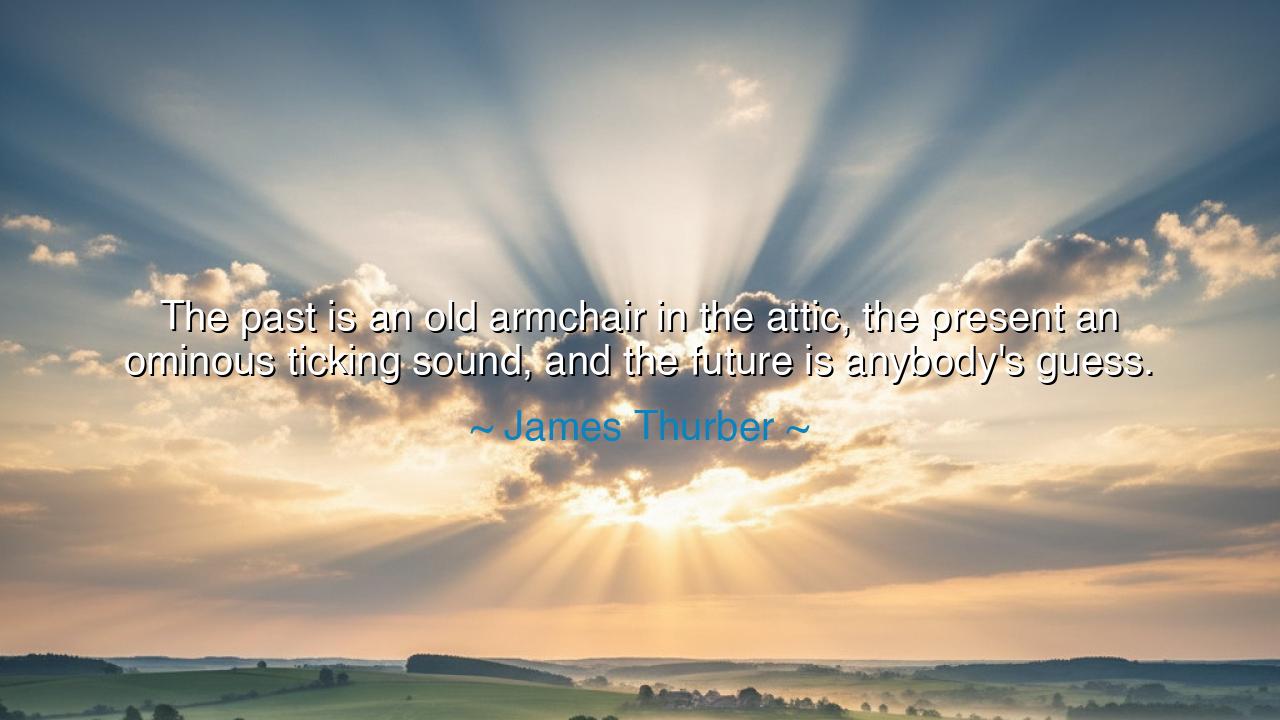
The past is an old armchair in the attic, the present an ominous
The past is an old armchair in the attic, the present an ominous ticking sound, and the future is anybody's guess.






The humorist James Thurber, a man whose wit concealed deep wisdom, once said: “The past is an old armchair in the attic, the present an ominous ticking sound, and the future is anybody’s guess.” Beneath the cloak of humor lies a meditation on the human condition—how we dwell between memory and mystery, between what has been and what is yet to come. His words are gentle but haunting, like a bell that tolls in the quiet mind. They remind us that life is not a fixed story but a fragile balance between comfort, anxiety, and uncertainty. To live well, one must know how to sit with all three—the past, the present, and the future—without being consumed by any.
The past, Thurber tells us, is like an old armchair in the attic—a place familiar, worn, and comfortable, but also dusty and forgotten. It calls to us with the scent of memory, the softness of what once was. Many souls linger there too long, reliving old joys and pains, mistaking nostalgia for life itself. But the ancients taught that memory, while sacred, is a double-edged gift. The past should be remembered, yes, but not inhabited. It is the archive of the soul, not its dwelling place. To live in the past is to sit endlessly in that armchair, watching the world move on without us. The wise return there only to retrieve lessons, then descend again to the living world below.
And what of the present, that ominous ticking sound? Thurber captures in this image the uneasy heartbeat of existence. The present moment is fleeting—each second passing as quickly as it arrives, each tick a reminder that time is both gift and thief. To the unmindful, this ticking is dreadful, for it announces mortality and the relentless march toward the unknown. Yet to the awakened soul, it is holy—it is the drumbeat of being alive. The present is not to be feared, but embraced, for it is the only time that truly belongs to us. The past is gone; the future unborn. Only this breath, this heartbeat, this instant, is real. To hear the ticking and still smile is to have found peace amid the passing of time.
Then comes the future, the realm of uncertainty—anybody’s guess, as Thurber calls it. Here the humor masks a profound truth: the future cannot be predicted, only prepared for. The wisest minds, from prophets to emperors, have strained to see what lies ahead, but the veil of tomorrow remains firm. Those who obsess over it often lose the joy of today. Yet those who ignore it completely walk blindly into storms. The future, then, demands courage—not fear. To face the unknown with hope is the greatest act of faith a person can make. The poet’s words remind us that humility is the beginning of wisdom: we do not control time, but we may shape our response to it.
Consider the story of Abraham Lincoln, a man who understood this delicate balance. His past was filled with hardship and failure—poverty, loss, and ridicule. Yet he did not sit in that old armchair of memory; he rose from it. His present, during the Civil War, was filled with the ticking of crisis and death, each decision weighted with destiny. And the future? It was uncertain, perilous, and beyond anyone’s foresight. Still, he moved forward—not because he knew what was to come, but because he believed that to act justly in the present was to shape the future’s course. In this way, Lincoln lived Thurber’s wisdom: he honored the past, endured the present, and trusted the future.
O seekers of truth, take heed of this teaching: every soul must learn to hold time with gentle hands. Do not fear the past, for it is your teacher. Do not resent the present, for it is your opportunity. And do not dread the future, for it is your inheritance. The ticking clock is not your enemy—it is your guide, reminding you that every moment is precious and passing. The past rests behind you like an old chair; the future waits ahead like a misty horizon; but your feet, firm and alive, stand here—now—on the path of life.
So, live as the ancients counseled: with awareness, humility, and courage. Visit the attic of memory, but do not dwell there. Listen to the ticking of time, but do not let it frighten you. Step toward the future, though you cannot see its end. For in truth, to live is not to master time but to dance with it. And when you have learned to find peace among the armchair, the ticking, and the mystery, then you shall have mastered the art of being fully, gloriously human.






AAdministratorAdministrator
Welcome, honored guests. Please leave a comment, we will respond soon